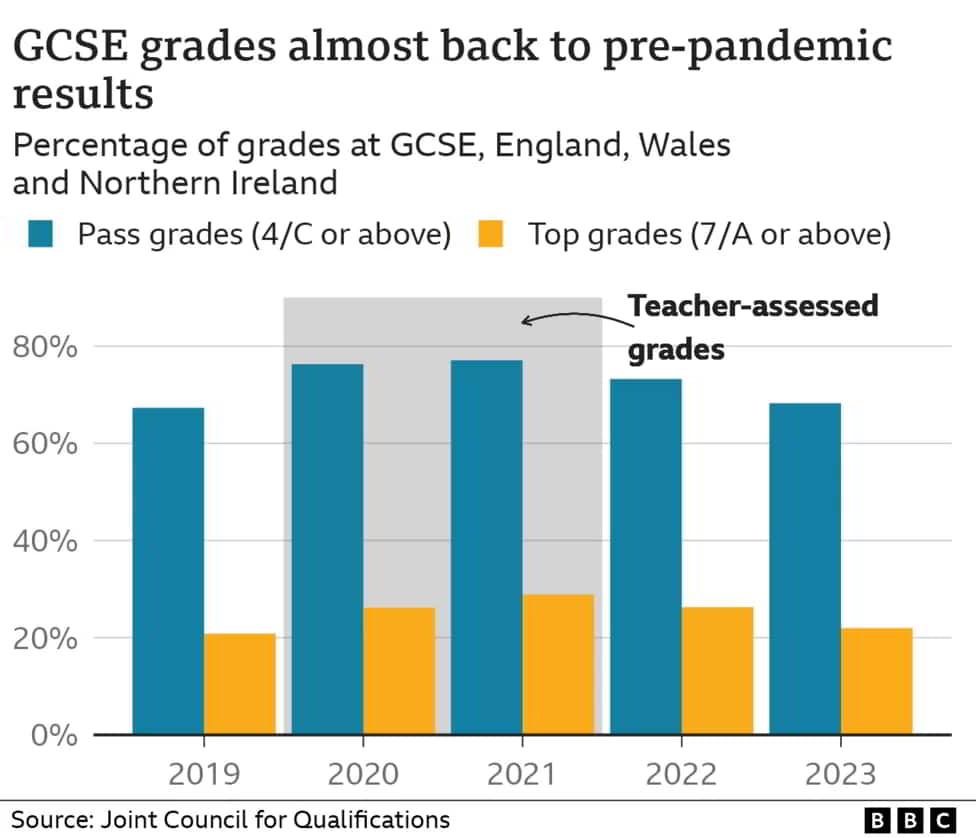Covid had a significant impact on children’s education with a huge amount of lost learning occurring. Recent news has highlighted that GCSE students will get additional support during their exams. The BBC News stated:
“GCSE students in England will get formulae and equations in their maths and science exams under plans to limit the impact of Covid.”
This has raised the debate as to whether this support should continue to alleviate the learning gaps caused by the pandemic or whether this could diminish a student’s true understanding of their knowledge on certain topics.
Teacher-assessed grades led to heightened results and now GCSE grades have almost returned to pre-pandemic results.

source: BBC News
Could this continued support fluctuate results again whilst not providing a true representative of students’ knowledge and educational understanding?
Arguments for continued support
- Focus on Understanding and Problem-Solving: Providing formulae and equation sheets allows students to focus on their understanding of concepts and problem-solving skills, rather than spending time memorising formulae and equations. This can free up valuable time for students to practise applying these concepts to solve complex problems.
- Level the Playing Field: Formulae and equation sheets can help to level the playing field for students with different levels of mathematical ability. Students who may not have had as much opportunity to memorise formulae and equations can still demonstrate their understanding of the subject matter by applying their knowledge to solve problems.
- Reduce Stress and Anxiety: Providing formulae and equation sheets can help to reduce test anxiety and stress for students. This can allow them to focus more on their exam performance and less on worrying about remembering specific formulae and equations.
Arguments against continued support
- Diminish Rigour: Some argue that providing formulae and equation sheets can diminish the rigour of exams and make them less representative of students’ true understanding of the subject matter. By allowing students to access formulae and equations without having to memorise them, the exams may not accurately assess their ability to recall and apply these concepts independently.
- Reduce Critical Thinking: Opponents of formulae and equation sheets believe that their use can reduce the development of critical thinking skills. When students have access to these sheets, they may be less inclined to think critically about the problems and develop their problem-solving strategies
- Too reliant: Another argument is that providing formulae, equations and additional support for students can create a dependence on having them during their exams. This could also result in a lack of enthusiasm for learning, revision and academic and personal development in the future if everything is already provided for students.
Moving past Covid and looking forward
Ultimately, this debate could go on for some time, we won’t truly understand the impact that Covid has had on the generation of students for a few years. There could be the argument that the brunt of the pandemic is now over and so students should have relatively caught up on lost learning.
On the other hand, increased mental health challenges and a lack of resources and high-quality support, have meant that students have suffered greatly in their education. The main thing we need to do is find the best solution that fits each child to accommodate their needs.
If you would like to learn about an effective online alternative provision and how it can assist with attainment levels and personal development then call EDClass on 01909 568338, send an email to mail@edclass.com or enquire for more information here.










